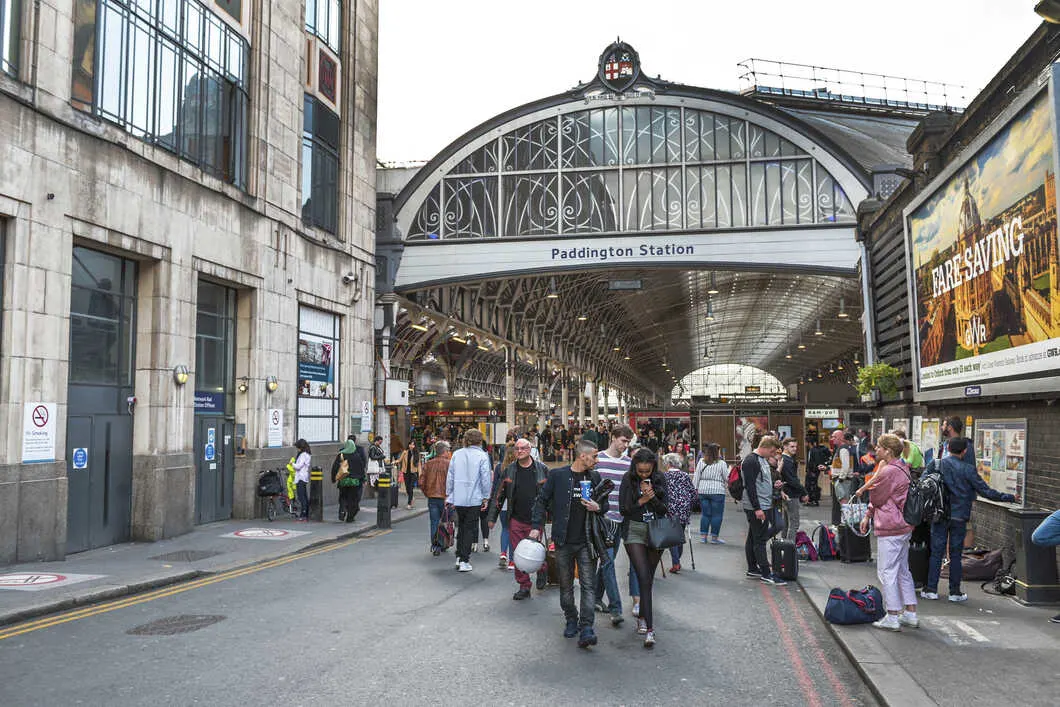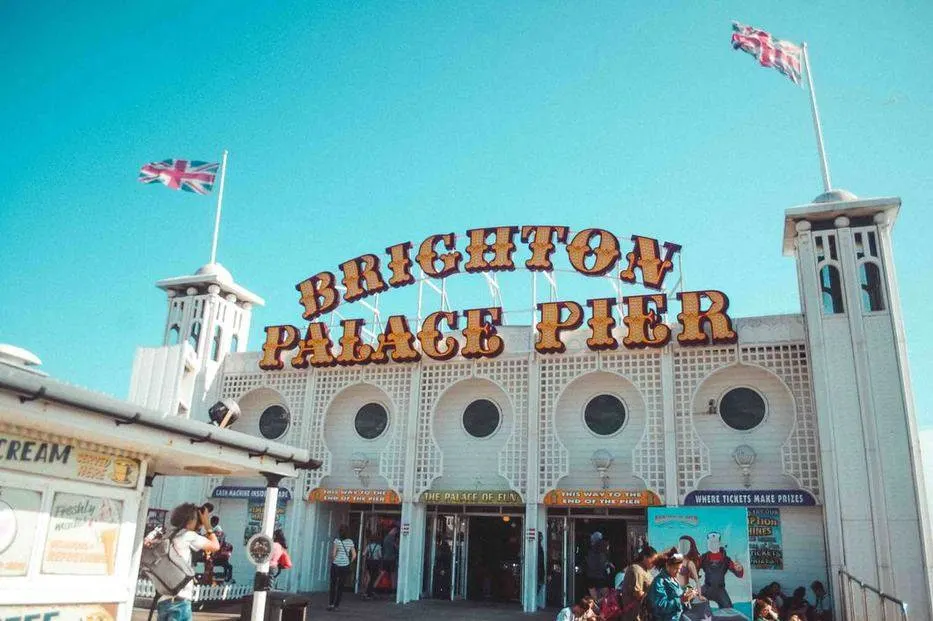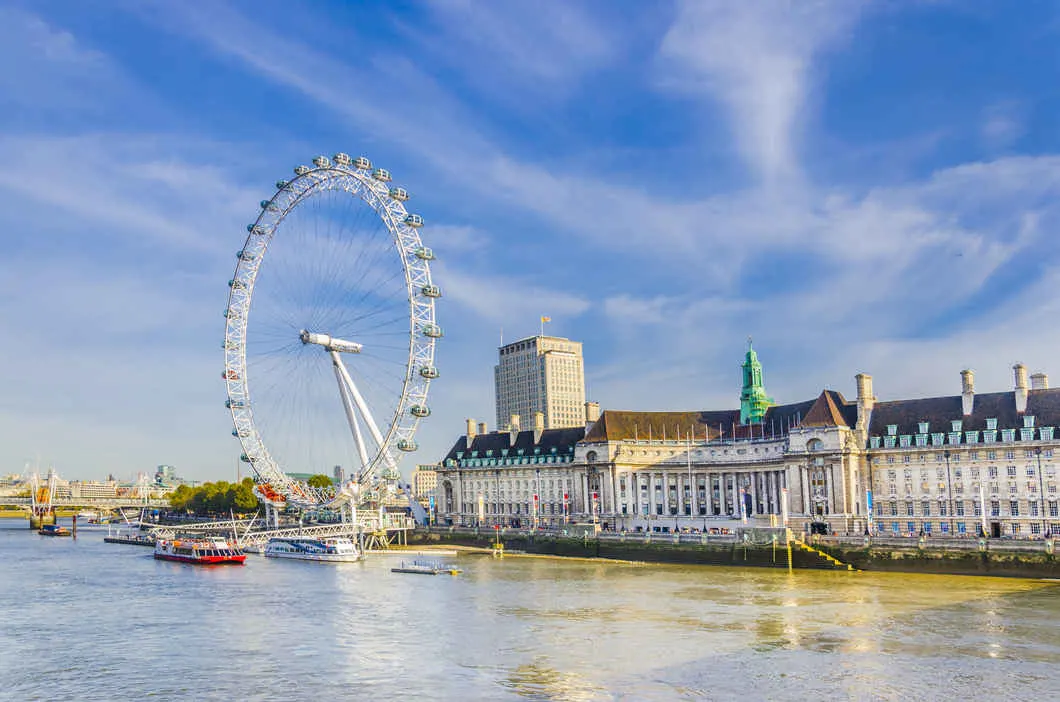It’s no secret that England isn’t the cheapest country to travel to. That being said, it’s easier when you know exactly how much you should budget for a one week trip to England.
The average person spends £511 a week (£73 a night) on accomodation and £623 spending money per visit to England. An average total of £1,134 per week.
This takes into consideration budgeting for transport, accommodation, food and leisure. While spending varies depending on the kind of traveller you are, a rough idea of how much things cost in your country of destination can really help you put together a budget.
Disclaimer: Hi! this post may contain affiliate links which will take you to online retailers that sell products and services. If you click on one and buy something, I may earn a commission, see my Affiliate Disclosure for more details.
Here is a complete guide to how much you should spend for a week in England.
Transport Costs for Travel in England

Price of Public Transport in England
England has a well-connected public transport system with buses, coaches and trains linking different cities throughout the country. You can even take domestic flights from one city to another, for example from Southampton to Newcastle. Sometimes, flying from one city to another works out even cheaper than catching the train.
Major cities like Manchester and Birmingham have trams which are pretty affordable. For example, the Birmingham city hop single for an adult is £1.50 and £0.70 for a child.
Although not all cities in England have trams, buses are available in all cities and towns and cost between £1.50 and £2 for a single, and between £2 and £4 for a return ticket. Buses are also available in rural areas, although you’ll find that they don’t run as often as in busier towns.
The two main coach companies in England are Megabus and National Express. They have great connections around the country and tickets are really good value.
For example, a single journey from Liverpool to London booked a week in advance costs approximately £8. Shorter distance journeys, for example a single from Manchester to Leeds, cost about £4.
Although they do take significantly longer than trains, they’re a good option if you want to save money.
You’ll often hear Brits complain about trains. While they’re much more expensive than other countries in Europe, they have a wide network that covers the whole country.
It’s also a much faster way of getting around if you’re on a tight schedule. A single train journey from Liverpool to London booked a week in advance costs between £30 and £60, depending on the time.
Peak hour trains are much more expensive, costing up to £120! So, it’s a good idea to travel during off-peak times when you can get some good deals.
Taxis are another option for getting around, although these can be expensive, especially in London. There are the metered taxis which you can hail in the street and minicabs which are advanced bookings only. They cost around £3 to £5 per mile. You’ll find ridesharing apps like Uber available in most towns and cities.
Looking for inspiration of places to travel in England? Here are 15 places you can travel in England without a car.
Money Saving Tips for Public Transport in England
Local buses have the option of day riders and weekly tickets, which work out a lot cheaper than buying several single tickets. Travelling outside of peak times is also a major way to save money.
Peak hours on coaches and trains are usually around 6am – 9pm, and start again at 4pm – 6pm. Some days of the week are much more expensive, mainly Friday, Saturday and Sunday. If you’re visiting during the holidays, for example Easter and Christmas, ticket prices tend to be a lot higher.
Another tip is booking tickets in advance. You can save a lot of money this way, although this can be tricky when you’re on holiday and don’t have set plans! For example, the cheapest single from Liverpool to London three weeks in advance can cost as little as £12. A single on the same route, being booked for tomorrow, can cost up to £90.
Consider getting a railcard if you’re under 26, over 60, travel as a family, travel as a couple, or have a registered disability. Railcards give 1/3 off Anytime, Off-Peak and Advance fares which is perfect if you plan on travelling England by rail!
If you’re only in England for a week, you may be able to find weekly passes which are good value if you’re planning on frequently taking public transport.
Transport for London (TfL) has travel cards which are valid for a week and can be used on the Tube, overground and National Rail trains in London, London buses, trams in South London and the Docklands Light Railway.
Price of Car Rental in England
Renting a car is a great way to make the most of your time, especially if you’re only in England for a week. It also helps you get around remote places like the Lake District, which is full of hidden spots and charming little villages.
Prices for renting a car vary massively depending on how long you want it for, but there are many price comparison websites to help you out such as Kayak and Car Rentals. On average hiring a car in England costs £148 per week (£21 per day).
This is also the quickest way to scan the web for the cheapest price. The only downside to renting a car is high parking costs and fuel if you’re on a budget, and being stuck in traffic jams if you’re on a tight schedule.
If your itinerary consists of exploring the countryside and rural areas, then renting a car is probably the most efficient way of getting around.
Money Saving Tips for Car Hire in England
Book in Advance
Booking a car in advance can save you hundreds of pounds. When running your searches you will get better deals when renting 7 days over 5 to 6 days. Even if you don’t plan on using it for 7 days check this against the 5 to 6 days prices.
Fuel
In terms of fuel, I would recommend checking the terms and conditions carefully. Oftentimes, rental companies will provide a full tank which you pay upfront for, but not provide a refund for any unused fuel.
Even if the company does give you a refund, there are often processing fees slipped into the contract. The best way to avoid this is to take out a ‘return as you found it’ policy. On most comparison sites you can filter results by fuel policies.
Milage
In the T&Cs check the number of miles/km your deal includes. I normally aim for unlimate milage so I don’t need to worry about how much driving I do. However, when I did my great British road trip I did have a milage cap as it reduced the cost for the car. If I went over that I would have been an additional £0.10 per mile I went over.
Insurance
When you book a car, basic insurance policies will be included, but you’ll have to pay an excess charge if you need to use them. Sometimes firms will have top-up insurance which gets rid of this excess, and this can be really expensive.
I wouldn’t recommend using this top-up insurance. Instead, find an excess policy from an independent provider who charges a lot less. How this works is that when you pay the hire company’s excess charge, you can then reclaim the money from the independent provider.
Check the T&Cs as not all car companies allow third party insurance.
Driving in England Tips
- Fill-up at supermarket petrol stations – Asda, Morrisons, Sainsburys, Tesco etc. will all offer cheaper petrol by some margin. If you stop at any of the petrol stations along the motorway you could easily see prices increased by 10 to 20 pence per litre!
- Potential Tolls – Some routes in England can have tolls but I have found these pretty easy to avoid. Check Google maps before driving and it will highlight toll roads. For example, the M6 has one, however, you can just take the non-toll M6 route to save the money.
- Download Parking Apps – A lot of parking around the country is paid and I am not sure about you but I never really carry cash any more. Download these apps before hitting the road; Just Park, Pay by Phone and Ring Go. They were by far the most frequent ones I encountered. Another way I have saved money with parking in cities is by booking in advance on Just Park. Weirdly in Bristol, it was cheaper to pay for a week’s worth of parking than two days!
Accommodation Costs for England Trip

Price of Accommodation England
A large chunk of your holiday budget will be spent on accommodation. Prices vary greatly depending on where you’re staying in the country and the type of accommodation you choose e.g. hostels, apartments, boutique hotels etc.
The table below illistrates the daily averages for acommodation in England. Like any country the big cities will be more expensive to stay.
Daily Average | Estimated Weekly Cost | |
Hostel | £24.57 | £171.96 |
Hotel | £64.75 | £453.25 |
Airbnb | £70.10 | £490.70 |
Staying in hostels is a fantastic way to save money on your trip. Depending on the location and number of people you share with, you can find rooms starting from £10 per night.
A typical double occupancy room in a top tier hotel can set you back around £100 to £140 per night. For mid-tier hotels, you can find rooms that cost between £40 and £80 per night.
These numbers are significantly higher in touristy cities like London. An advantage of staying at a hotel is that most of them offer breakfast included in your room price, so you’ll save money on eating out.
Another option is Airbnb, and you can get some really good deals on there. It’s also a good way to meet locals and get a feel for the culture of the place. If you’re staying for a whole week in one place, it might be worth looking into renting an apartment, especially if you’re travelling with a large group.
These can be cheaper than hotels, and you have the option of cooking from home too, which further saves on meals out. For a week’s stay at an apartment in England (not London), you’re looking at around £400 to £900 for a one or two-bedroom apartment. Split between you and others, this would significantly lower your costs compared to staying at a hotel.
If you want to travel around the UK while also saving money, it’s a good idea to rent a motorhome or a campervan. Your accommodation and transport will be covered, and it also offers you much more flexibility in getting around.
Bunk Campers is one of the largest campervan and motorhome rental companies in the UK, and is a good place to start. Most rental companies have depots all over the country so they’re easy to pick up and drop off wherever you are.
Money Saving Tips for Accommodation in England
Use a comparison site like Booking.com, Tripadvisor and SkyScanner to see reviews and compare different places. If you’re more of a spontaneous person or don’t have set travel plans, it’s worth taking a look at Lastminute.com for some bargain deals.
Some hotel chains such as Marriott and Hilton have loyalty schemes which you can sign up to and get special offers when you sign up. Similarly, registering with hotels and websites for email alerts can get you some pretty good discount codes.
Another handy trick to save money on accommodation is the rebook trick. Depending on the hotel, sometimes you can get free cancellation. If you notice the price has dropped, simply cancel your booking and rebook it with the new, lower price.
Travel or reward credit cards also are a great source of deals, I often see deals on £100 off if I spend £300.
Food Costs for England trip

Price of Eating Out in England
Eating out in England is generally quite affordable. There is such a large range of places you can eat, from street food stalls to chain restaurants, to fine dining.
Especially in cities, you’ll find plenty of street food stalls and food trucks in markets, shopping centres and around city centres. From wraps and burgers, to sweet treats and desserts, you’ll be spoilt for choice.
The UK’s rising foodie scene means that there is a lot of international street food as well. Expect to pay around £4 to £8 for a meal from a street food vendor.
If you’re staying somewhere which has a kitchen, it’s worth making your own meals as you can save a lot of money on dining out. Discount supermarkets like Aldi and Lidl are very affordable, and local markets are great for fresh produce.
England has such an extensive choice of restaurants that sometimes it can be hard to pick where to eat. The average mid-tier restaurant meal costs between £10 and £20 for one course and a drink.
If you’re looking to have a traditional Sunday roast, a local pub or carvery is a good option. You’ll find that portions are really generous and you can expect to pay around £7 to £13 for a meal of Yorkshire pudding, boiled or steamed veg, roast potatoes, vegetarian roast, roast beef, turkey or pork and a range of sauces.
Money Saving Tips for Eating Out in England
To save some money, eat at an ethnic restaurant. The UK has such a large choice of ethnic cuisine, including Indian, Chinese, Thai, Vietnamese, Arabic and much more. Prices tend to be much lower than at British or European restaurants.
If you’re out for the day and want to take a packed lunch with you, large supermarkets like Sainsbury’s, Tesco and Morrisons do meal deals where you get a sandwich/wrap/pasta dish, plus a snack and drink for £3. Independent sandwich shops also have a good choice of homemade lunches which tend to be much cheaper than chains like Subway.
Many sit down restaurants have fixed price menus which are often cheaper than ordering a la carte. These usually consist of two or three course meals, and these can save you a lot if you do fancy eating in a restaurant.
Fish and chips is a must when visiting England, and luckily enough this is a cheap meal. Look out for a ‘chippie’ near you, where you can order chips with the addition of battered cod, haddock, sausages or a meat pie. Meals usually cost around £4 to £6 each.
If the place you’re staying at allows you to order in takeaway, then this can be a good money saving trick. Apps like Just Eat and Uber Eats often have promo codes which will help you save money on orders.
Open Table is a handy website which lets you find restaurants, read reviews and book online. There is a specials section when you filter results, which allows you to find deals that are 50% off, or set your budget for £20 and under.
Sightseeing Costs for England Trip

Costs for Sightseeing in England
England is home to many world-class attractions. If you’re planning on doing a lot of sightseeing, you’ll want to budget enough so that you can tick off everything on your list.
It comes as no surprise that London is the most expensive city to sightsee. Although there are tons of free attractions, there are also paid attractions which can sometimes put a dent in your wallet. For example, the standard adult ticket for the London Eye costs £27 if booked in advance.
With my guide on what to book in advance in London, you will be covered on how to get discounts and when you should book!

Sports play a prominent role in English society and the country is home to world-class rugby, football, cricket and tennis. The majority of sports stadiums in England are open to visitors, and they also run guided tours where you can see inside the grounds, dressing rooms, press rooms etc. Sports stadium tours usually cost between £15 and £25, depending on the extent of the tour.
Most cities in England such as Manchester, Liverpool, York and Brighton, have hop on hop off bus tours which are a fun way of taking in the sights if you’re pressed for time. Tickets cost around £11 for an adult, and you can get good offers on family passes.
Money Saving Tips for Sightseeing in England
Visit Britain is the official tourism website for Great Britain and there many different sightseeing passes to help you save money exploring the country. If you’re planning on staying in London, there are different kinds of passes which give you access to all the top attractions, theatre scenes and nightlife.
There are also tons of passes if you want to explore the countryside or other cities in the UK like York, Blackpool and Portsmouth. Depending on the pass, this can cost between £20 and £79. A bonus of using a prepaid pass is that you can jump the queue!
England is home to an abundance of historic and cultural landmarks. From prehistoric times to Roman conquerors and Norman invaders, the different influences are reflected in the diversity of historical sites. One off entry fees to these places can quickly add up, so the best way of visiting heritage sites is to invest in a heritage pass.
These passes are offered by the National Trust and English Heritage, and allow you to access hundreds of sites including the iconic Stonehenge and Stourhead. The National Trust Touring Pass costs £33 for one adult for seven days. The ‘admit two’ option much better values and costs £58.
Meanwhile, the English Heritage Overseas Visitor Pass lasts for a minimum of nine days, and this costs £37.
If you happen to be visiting in September, you’re in luck – thousands of historic monuments and buildings open their doors to the public for free. Check out Open House London for sights in the capital, and Heritage Open Days for sights around the country. Additionally, September is the very end of tourist season so it’s a much cheaper time to travel in general.
National museums in England are all free, and you’ll find them dotted all around the country. From the iconic National Gallery in London to the National Football Museum in Manchester, it’s definitely worth putting a visit to a museum on your itinerary.
England has 10 fantastic national parks and it would be a shame not to get outside and enjoy the rolling countryside, lush woodland and stunning valleys and lakes.
They’re all free to enter and are suitable for the whole family, with trails for all abilities. There are so many things you can do in the national parks, from walking, hiking, cycling, wildlife watching, orienteering, camping and much more.
Groupon can be a useful tool if you’re looking to save money off experiences, days out and sightseeing. It’s a service where you can find virtual coupons for anything from food and drink, to shopping and days out. Save up to 50% off experiences like afternoon tea and Thames river cruises.
Must know tip! Days Out Guide is a great way to save money across the UK! It offers 2 for 1 price for certain attractions across England, Wales and Scotland.
To be able to use the deal you need to book the vouchers online or visit a rail station for the voucher (it needs to be a physical copy) and have a National Rail ticket for each person. I’ve used 2 for 1 on the Tower of London before which saved my mum and I £15 each on our entry.
In Summary: How much do you need for a week in England?
How much you’ll spend on a one week holiday in England varies greatly depending on where you’re staying, how much you’re travelling, what you’re planning to see and where you go for meals.
However, as an average figure, I would suggest budgeting around £1,000 for the whole week.
This number can be much lower if you’re a budget traveller, as there are plenty of ways to make your holiday a cheap one – staying at hostels, cooking for yourself or eating at cheap places, visiting free sights etc.
If you’re travelling as a family or a group then prices can be brought down even further, as kids’ tickets tend to be cheaper and accommodation can be shared.
More England Travel Inspiration and Tips
9 Reasons You Need Travel Insurance for the UK
Your Guide to What’s in Whitstable: A Day-Trip
1 Week Trip to England Cost & Money-Saving Tips!
Money Exchange and Paying in London: 13 Tips and Tricks
10 Amazing Places to Visit in England Outside of London
This is Why English Homes Have Two Taps (& How to Adapt)

Kat
Hi, I'm Kat, an Australian that moved to London in 2013 to start a new adventure. What a roller-coaster that was! I love helping others move to the UK and people explore the world! I’d be honoured if you’d say, “Thanks!” with a £3 coffee on Ko-fi.








